March 26, 2016 •
FEC May Consider Motion for Rule-Making Concerning Certification of Certain Political Contributions
On March 31, the Federal Election Commission may consider a motion to open a rule-making concerning whether to require entities accepting political contributions from corporations to verify those corporations are associations of United States citizens who are eligible to contribute. […]
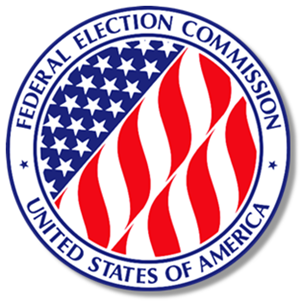 On March 31, the Federal Election Commission may consider a motion to open a rule-making concerning whether to require entities accepting political contributions from corporations to verify those corporations are associations of United States citizens who are eligible to contribute.
On March 31, the Federal Election Commission may consider a motion to open a rule-making concerning whether to require entities accepting political contributions from corporations to verify those corporations are associations of United States citizens who are eligible to contribute.
On March 24, Commissioner Ellen L. Weintraub submitted the motion contending there is “no framework in place to assist entities accepting political contributions or making independent expenditures and electioneering communications in complying with existing law.” Federal law prohibits foreign nationals from making political contributions and expenditures. Federal contractors are also prohibited from making certain political contributions and expenditures.
Weintraub is further requesting the commission direct the Office of General Counsel to draft a rule-making document requiring those making independent expenditures and electioneering communications certify resources used are not owned or controlled by foreign nationals.
March 1, 2016 •
U.S. Sen. Tom Udall Moves to Replace FEC
Today, U.S. Sen. Tom Udall is introducing the Federal Election Administration Act, a bill intended to replace the Federal Election Commission. The legislation is supported in letters to U.S. Senators from several reform groups, including the Campaign Legal Center, Common […]
 Today, U.S. Sen. Tom Udall is introducing the Federal Election Administration Act, a bill intended to replace the Federal Election Commission. The legislation is supported in letters to U.S. Senators from several reform groups, including the Campaign Legal Center, Common Cause, Democracy 21, Issue One, People for the American Way, Public Citizen, Rootstrikers, and U.S. PIRG. According to the letter, a five-member Federal Election Administration will be created to enforce election laws and “will consist of a chairman and four other members, all of whom are to be appointed by the president, with the advice and consent of the Senate.” No more than two members of the agency can be from the same political party. The letter can be found here.
Today, U.S. Sen. Tom Udall is introducing the Federal Election Administration Act, a bill intended to replace the Federal Election Commission. The legislation is supported in letters to U.S. Senators from several reform groups, including the Campaign Legal Center, Common Cause, Democracy 21, Issue One, People for the American Way, Public Citizen, Rootstrikers, and U.S. PIRG. According to the letter, a five-member Federal Election Administration will be created to enforce election laws and “will consist of a chairman and four other members, all of whom are to be appointed by the president, with the advice and consent of the Senate.” No more than two members of the agency can be from the same political party. The letter can be found here.
February 10, 2016 •
Federal Lobbyist Bundling Disclosure Threshold for Lobbyists Unchanged for 2016
Today, the Federal Election Commission (FEC) published its price index adjustments for expenditure limitations and lobbyist bundling disclosure threshold in the Federal Register. The lobbyist bundling disclosure threshold remains unchanged for 2016 and continues at the 2015 rate of $17,600. […]
 Today, the Federal Election Commission (FEC) published its price index adjustments for expenditure limitations and lobbyist bundling disclosure threshold in the Federal Register. The lobbyist bundling disclosure threshold remains unchanged for 2016 and continues at the 2015 rate of $17,600. This threshold amount is adjusted annually. Federal law requires authorized committees of federal candidates, leadership political action committees (PACs), and political party committees to disclose contributions bundled by lobbyists and lobbyists’ PACs. Additionally, the FEC published its adjusted Coordinated Party Expenditure Limits for political parties for 2016.
Today, the Federal Election Commission (FEC) published its price index adjustments for expenditure limitations and lobbyist bundling disclosure threshold in the Federal Register. The lobbyist bundling disclosure threshold remains unchanged for 2016 and continues at the 2015 rate of $17,600. This threshold amount is adjusted annually. Federal law requires authorized committees of federal candidates, leadership political action committees (PACs), and political party committees to disclose contributions bundled by lobbyists and lobbyists’ PACs. Additionally, the FEC published its adjusted Coordinated Party Expenditure Limits for political parties for 2016.
February 10, 2016 •
FEC Adds Memo Item to Disclosure Forms
The Federal Election Commission (FEC) has updated some of its disclosure forms required by PACs, political parties, and campaigns. Specifically, the FEC has added a “memo item” box to Forms 3, 3P, and 3x. Formerly, committees would routinely write the […]
 The Federal Election Commission (FEC) has updated some of its disclosure forms required by PACs, political parties, and campaigns. Specifically, the FEC has added a “memo item” box to Forms 3, 3P, and 3x. Formerly, committees would routinely write the phrase “memo item” on the form. The new box, which the FEC hopes increases “reporting clarity”, can be used to report supplemental information and the expense amounts not included in the line item total, such as reattributions, reimbursements, and certain credit card transactions. The FEC believes the new box will shorten document processing time and allow public access to disclosed data faster, according to the FEC’s press release.
The Federal Election Commission (FEC) has updated some of its disclosure forms required by PACs, political parties, and campaigns. Specifically, the FEC has added a “memo item” box to Forms 3, 3P, and 3x. Formerly, committees would routinely write the phrase “memo item” on the form. The new box, which the FEC hopes increases “reporting clarity”, can be used to report supplemental information and the expense amounts not included in the line item total, such as reattributions, reimbursements, and certain credit card transactions. The FEC believes the new box will shorten document processing time and allow public access to disclosed data faster, according to the FEC’s press release.
January 21, 2016 •
D.C. Circuit Appeals Court Rules Against Van Hollen
The U.S. Court of Appeals for the D.C. Circuit has reversed a lower court ruling and rejected the challenge from Maryland Rep. Chris Van Hollen (D) concerning a Federal Election Commission (FEC) rule about reporting of electioneering communications or advertisements […]
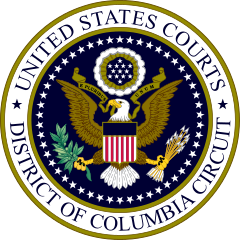 The U.S. Court of Appeals for the D.C. Circuit has reversed a lower court ruling and rejected the challenge from Maryland Rep. Chris Van Hollen (D) concerning a Federal Election Commission (FEC) rule about reporting of electioneering communications or advertisements picturing or naming candidates within 60 days of an election. In doing so, the federal appeals court upheld the FEC rule requiring public reporting only of donors who earmark contributions for the ads.
The U.S. Court of Appeals for the D.C. Circuit has reversed a lower court ruling and rejected the challenge from Maryland Rep. Chris Van Hollen (D) concerning a Federal Election Commission (FEC) rule about reporting of electioneering communications or advertisements picturing or naming candidates within 60 days of an election. In doing so, the federal appeals court upheld the FEC rule requiring public reporting only of donors who earmark contributions for the ads.
Van Hollen and other campaign finance disclosure advocates argued the rule was too narrow and did not conform to a 2002 law prohibiting “soft money” in federal elections.
December 18, 2015 •
FEC Selects Matthew Peterson as Chairman
On December 17, the Federal Election Commission (FEC) elected Matthew Petersen as its chairman and Steven T. Walther as its vice chairman for 2016. Peterson has been a commissioner with the FEC since 2008 and Walther has been a commissioner […]
 On December 17, the Federal Election Commission (FEC) elected Matthew Petersen as its chairman and Steven T. Walther as its vice chairman for 2016.
On December 17, the Federal Election Commission (FEC) elected Matthew Petersen as its chairman and Steven T. Walther as its vice chairman for 2016.
Peterson has been a commissioner with the FEC since 2008 and Walther has been a commissioner since 2006. Each previously served as both chairman and vice chairman. They are two of the four commissioners serving with expired terms. Normally, each member serves a six-year term with a rotating chairmanship among the members with no member serving as chairman more than once during his or her term.
October 27, 2015 •
FEC to Unveil Beta-Version of New Website on Thursday
On October 29, the Federal Election Commission (FEC) will make public a new version of the FEC website. The beta version being unveiled will be a functioning prototype in its first stage of development, according to an FEC press release. […]
 On October 29, the Federal Election Commission (FEC) will make public a new version of the FEC website. The beta version being unveiled will be a functioning prototype in its first stage of development, according to an FEC press release. The FEC will be asking for public feedback on the new website, which will also include new search functions and improved access to legal materials. A link to the beta version will be available on the Commission’s existing website.
On October 29, the Federal Election Commission (FEC) will make public a new version of the FEC website. The beta version being unveiled will be a functioning prototype in its first stage of development, according to an FEC press release. The FEC will be asking for public feedback on the new website, which will also include new search functions and improved access to legal materials. A link to the beta version will be available on the Commission’s existing website.
July 30, 2015 •
Proposed FEC Rules Up for Public Comment
The Federal Election Commission (FEC) is seeking public comment on new campaign finance regulations addressing disclosure of independent expenditures and electioneering communications. The FEC is also seeking comment on new rules addressing solicitations of corporate and labor organization employees and […]
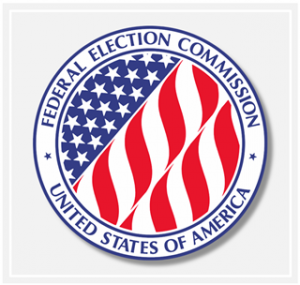 The Federal Election Commission (FEC) is seeking public comment on new campaign finance regulations addressing disclosure of independent expenditures and electioneering communications. The FEC is also seeking comment on new rules addressing solicitations of corporate and labor organization employees and members, independence of expenditures made by independent expenditure-only political committees and accounts, and election-related spending by foreign nationals.
The Federal Election Commission (FEC) is seeking public comment on new campaign finance regulations addressing disclosure of independent expenditures and electioneering communications. The FEC is also seeking comment on new rules addressing solicitations of corporate and labor organization employees and members, independence of expenditures made by independent expenditure-only political committees and accounts, and election-related spending by foreign nationals.
Comments may be submitted electronically at http://www.fec.gov/fosers, referencing REG 2015–04, and must be submitted on or before October 27, 2015.
Last week the U.S. District Court of Appeals for the District of Columbia unanimously upheld the constitutionality of the law barring contractors from contributing to candidates, parties, and candidates’ and parties’ committees. Plaintiffs had challenged the constitutionality of 52 U.S.C. […]
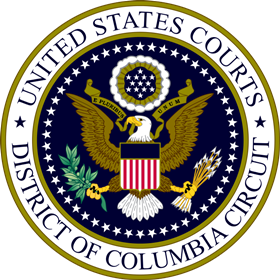 Last week the U.S. District Court of Appeals for the District of Columbia unanimously upheld the constitutionality of the law barring contractors from contributing to candidates, parties, and candidates’ and parties’ committees.
Last week the U.S. District Court of Appeals for the District of Columbia unanimously upheld the constitutionality of the law barring contractors from contributing to candidates, parties, and candidates’ and parties’ committees.
Plaintiffs had challenged the constitutionality of 52 U.S.C. § 30119(a)(1), which prohibits any vendors with contracts with the federal government from making political contributions to federal candidates or political parties. In Wagner v. Federal Election Commission, the plaintiffs had asked the court to declare the law unconstitutional as applied to individuals who have personal services contracts with federal agencies.
Because federal workers who are not contractors may make federal political contributions while contractors performing the same work may not, the suit argued the law violates both the Equal Protection Clause of the Constitution and the First Amendment.
June 26, 2015 •
Bill to Rework FEC Introduced in Congress
On June 25, 2015, a bill was introduced in the U.S. Congress to restructure the Federal Election Commission (FEC). House Resolution 2391, The Restoring Integrity to America’s Elections Act, would amend the Federal Election Campaign Act of 1971 to reduce […]
 On June 25, 2015, a bill was introduced in the U.S. Congress to restructure the Federal Election Commission (FEC).
On June 25, 2015, a bill was introduced in the U.S. Congress to restructure the Federal Election Commission (FEC).
House Resolution 2391, The Restoring Integrity to America’s Elections Act, would amend the Federal Election Campaign Act of 1971 to reduce the number of members of the FEC from 6 to 5. The bill would also revise the method of selection and the terms of service of members of the commission and alter the powers of the commission between the chair and the remaining members.
The sponsors of the bill are Jim Renacci (R-OH), Derek Kilmer (D-WA), Lou Barletta (R-PA), and John Carney (D-DE).
June 24, 2015 •
Lawsuit Alleges Presidential Debates Violate Election Law
On June 22, 2015, a lawsuit was filed against the Federal Election Commission (FEC) asking the court to direct the FEC to find the Commission on Presidential Debates (CPD) has made and accepted prohibited in-kind contributions when hosting presidential debates. […]
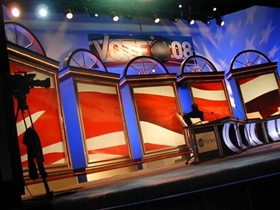 On June 22, 2015, a lawsuit was filed against the Federal Election Commission (FEC) asking the court to direct the FEC to find the Commission on Presidential Debates (CPD) has made and accepted prohibited in-kind contributions when hosting presidential debates.
On June 22, 2015, a lawsuit was filed against the Federal Election Commission (FEC) asking the court to direct the FEC to find the Commission on Presidential Debates (CPD) has made and accepted prohibited in-kind contributions when hosting presidential debates.
The plaintiff, Level the Playing Field, alleges the CPD violated 11 C.F.R. §110.13 by “staging candidate debates in a partisan manner and without pre-established, objective criteria.”
The lawsuit asserts, “[T]he CPD has rigged the rules governing who can be in the debates to ensure that no candidate other than the Democratic and Republican nominees will ever be invited to the debates. … [T]he CPD’s use of millions of dollars of corporate money to provide free televised campaign appearances to the Democratic and Republican presidential and vice presidential candidates violates [the Federal Election Campaign Act] – by making illegal corporate contributions to political candidates; by making illegal corporate campaign expenditures; by accepting illegal corporate campaign contributions; and by failing to disclose its contributions and expenditures.”
Level the Playing Field (LPF) is a nonprofit entity describing its purpose as the promotion of reforms allowing “for greater competition and choice in elections for federal office, particularly for the presidency and vice presidency.” Joining LPF in the lawsuit are the Green Party of the United States, the Libertarian National Committee, Inc., and Dr. Peter Ackerman.
Photo of a 2008 presidential debate stage by Ericci8996 on Wikimedia Commons.
April 10, 2015 •
North Dakota Democrats File FEC Complaint Over Foreign Contributions
Grand Fork Democrats in District 43 have filed a complaint with the Federal Election Commission (FEC) against state Republican officials and a political action committee (PAC) for receiving foreign campaign contributions. Gov. Jack Dalrymple, state Sen. Lonnie Laffen, and the […]
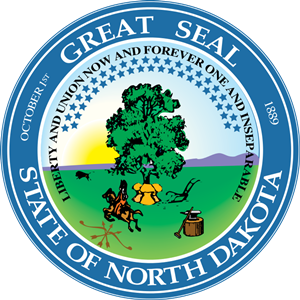 Grand Fork Democrats in District 43 have filed a complaint with the Federal Election Commission (FEC) against state Republican officials and a political action committee (PAC) for receiving foreign campaign contributions. Gov. Jack Dalrymple, state Sen. Lonnie Laffen, and the ND Oil PAC each reported receiving contributions from individuals with Canadian and/or United Kingdom addresses.
Grand Fork Democrats in District 43 have filed a complaint with the Federal Election Commission (FEC) against state Republican officials and a political action committee (PAC) for receiving foreign campaign contributions. Gov. Jack Dalrymple, state Sen. Lonnie Laffen, and the ND Oil PAC each reported receiving contributions from individuals with Canadian and/or United Kingdom addresses.
The complaint cites federal law and regulations prohibiting contributions from foreign nationals in federal, state, or local elections. North Dakota Secretary of State Al Jaeger has said he believes federal laws under the FEC apply to federal candidates, but do not apply to in-state, nonfederal candidates.
Democratic leaders also filed a request for an attorney general’s opinion on the interplay between federal and state law regarding foreign campaign contributions.
February 9, 2015 •
FEC Hearing Concerning McCutcheon Decision Scheduled for Wednesday
On February 11, the Federal Election Commission (FEC) will hold a public hearing regarding proposed rules in response to the U.S. Supreme Court decision in McCutcheon v. FEC. More than 30 witnesses have been scheduled to testify, including James Bopp, […]
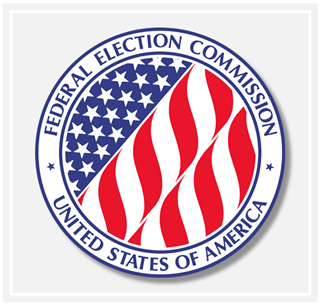 On February 11, the Federal Election Commission (FEC) will hold a public hearing regarding proposed rules in response to the U.S. Supreme Court decision in McCutcheon v. FEC.
On February 11, the Federal Election Commission (FEC) will hold a public hearing regarding proposed rules in response to the U.S. Supreme Court decision in McCutcheon v. FEC.
More than 30 witnesses have been scheduled to testify, including James Bopp, Jr. and Dan Backer, counsels for the McCutcheon case, and Shaun McCutcheon himself. A complete list of scheduled witnesses is available here.
The hearing, scheduled to begin at 8:15 a.m., is expected to last until at least 4:00 p.m.
February 3, 2015 •
Lobbyist Bundling Disclosure Threshold Increases to $17,600
On February 3, the Federal Election Commission (FEC) published its price index adjustments for expenditure limitations and lobbyist bundling disclosure threshold in the Federal Register. The lobbyist bundling disclosure threshold has increased to $17,600 for 2015 from $17,300 in 2014. […]
 On February 3, the Federal Election Commission (FEC) published its price index adjustments for expenditure limitations and lobbyist bundling disclosure threshold in the Federal Register. The lobbyist bundling disclosure threshold has increased to $17,600 for 2015 from $17,300 in 2014. This threshold amount is adjusted annually.
On February 3, the Federal Election Commission (FEC) published its price index adjustments for expenditure limitations and lobbyist bundling disclosure threshold in the Federal Register. The lobbyist bundling disclosure threshold has increased to $17,600 for 2015 from $17,300 in 2014. This threshold amount is adjusted annually.
Federal law requires authorized committees of federal candidates, leadership political action committees (PACs), and political party committees to disclose contributions bundled by lobbyists and lobbyists’ PACs.
State and Federal Communications, Inc. provides research and consulting services for government relations professionals on lobbying laws, procurement lobbying laws, political contribution laws in the United States and Canada. Learn more by visiting stateandfed.com.


